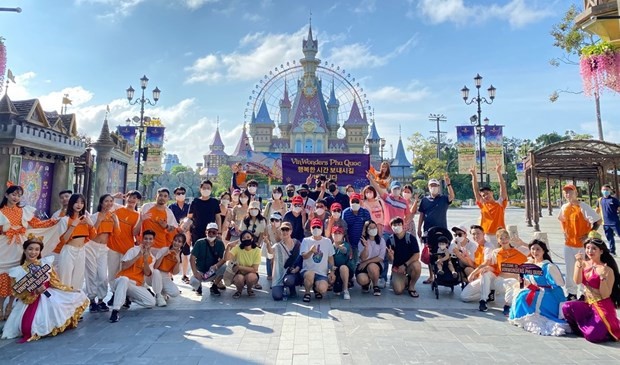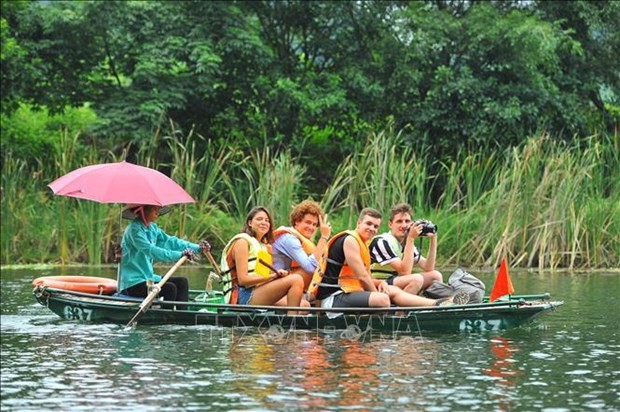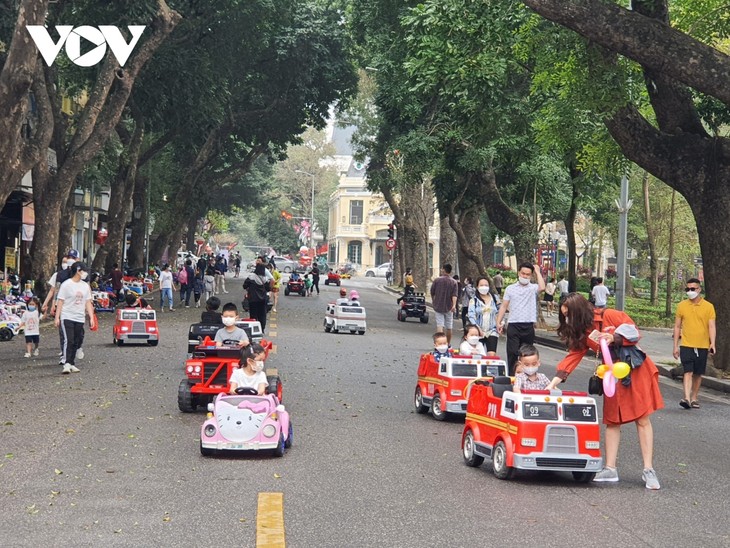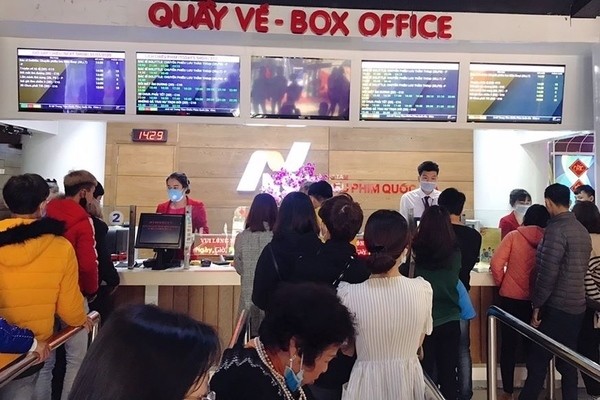 Foreign tourists visit Phu Quoc island after Vietnam reopened international tourism on March 15. (photo: VNA) Foreign tourists visit Phu Quoc island after Vietnam reopened international tourism on March 15. (photo: VNA) |
B: For visa application, we recommend you to visit the Vietnam National Web Portal on Immigration, E-visa page, which guides you to all necessary procedures such as a list of countries that are permitted E-visa issuance, a list of ports that allowed foreigners to enter and exit Vietnam by E-visa, and conditions for being granted an E-visa.
A: Foreigners who want to enter Vietnam can apply personally for an E-visa or can apply through the inviting/guaranteeing agencies and organizations. The E-visa fee is paid via an electronic payment gateway as prescribed by the Immigration Department. If you don’t want to complete all the procedures on your own, there are several travel agencies offering package tours to Vietnam at promotional prices.
B: Currently, all tourist sites, beaches and entertainment centers have reopened. Since the beginning of the year people have been able to travel freely, particularly on national holidays. Last week we enjoyed 3-day-holiday for the commemoration of the Hung Kings, the legendary founders of Vietnam.
 Foreign tourists take a boat trip in the Trang An complex, Ninh Binh province. (photo: VNA) Foreign tourists take a boat trip in the Trang An complex, Ninh Binh province. (photo: VNA) |
A: Public places and tourist sites have recently hosted numerous visitors. Hundreds of thousands of people visited the Hung Kings Temple Relic Site in Phu Tho province during the three-day national holiday. The official ceremony on April 10 saw about 200,000 people spending time at the temple to pay tribute to the nation's legendary founders.
B: Hundreds of thousands of people attended tribute ceremonies at Hung Kings’ temples across Vietnam, including Ho Chi Minh City, the Central Highlands province of Dak Lak and Lam Dong, and the southern provinces of Kien Giang, Vinh Long, Dong Nai, Can Tho and Ca Mau.
A: When the academic year ends in the late May and children have summer holidays, the tourism season will begin. With positive news of pandemic control and COVID-19 vaccination, people feel that it is safer to travel and gather.
 Pedestrian streets around Hoan Kiem lake reopen. (photo: VOV) Pedestrian streets around Hoan Kiem lake reopen. (photo: VOV) |
B: Vietnam has organized tourism promotion programs overseas to update travel agencies on its tourism resumption policy, travel products and services. Last week an event was held in London. Over the last 10 years, the number of British visitors to Vietnam has grown by 15-20 percent annually, which is partly thanks to direct flights conducted by Vietnam Airlines and Bamboo Airways.
A: The 15-day visa exemption for tourists to Vietnam is a perfect choice for those wishing to travel to the country. Before the pandemic, Vietnam posted annual tourism growth of 22.7 percent during 2015 - 2019.
B: Listener Aukiawa Osamu of Japan asks about the opening of cinemas in Vietnam.
A: Cinemas and art entertainment centers in Hanoi have been reopened since February after nearly 10 months of closure. On screen are Hollywood movies such as Spider-Man: No Way Home, Blacklight, Ambulance, and The Lost City and cartoons for children - The Bad Guys, Turning Red, and Sonic The Hedgehog 2. Vietnamese movies such as A Ghost Story, House Not For Sale, and Girls of Vietnam’s Southwestern Region also attract large audiences.
 Cinemas reopen since February, 2022 (photo: VOV) Cinemas reopen since February, 2022 (photo: VOV) |
B: This week we received reception reports from both regular and new listeners. We’re reading three letters from Fumito Hokamura of Japan, who tunes in to our programs daily and sends us reception reports every week. Fumito also listens to VOV’s programs in Japanese and Chinese. He has been listening to VOV since 1983.
A: He said through VOV he has learned a lot about the Vietnamese customs and lifestyles, the Mekong River Delta, President Ho Chi Minh – his career, morality, and diplomacy – and much more interesting information.
B: Fumito knows that April 30th marks the liberation of southern Vietnam for National Reunification in 1975. He sends a wish of eternal peace for Vietnam as well as for other countries worldwide.
A: Mohammed Waheed of India sent an email to VOV for the first time. He regularly visits VOV’s website vovworld.vn to listen to the audio programs and read stories.
B: He said that he likes VOVWorld service because it is interesting and informative with good coverage. He’d like to be included in VOV’s list of regular listeners.
A: Sudipto Chakraborty of India listened to VOV’s English program on April 10th on the frequency of 9730kHz. He said that the program was audible but not very good with SINPO at 23525.
B: Rob den Boer of Netherlands listened to VOV on April 9th on the frequency of 11885 khz. The signal was good and he rated SINPO at 54445.
A: Thank you all for your feedback and comments which are useful for us to improve our broadcast. We’ll soon be resuming postal service to send qualification cards to listeners.
B: French listener Joel Touchard asks about organizations for clubs for the elderly and their activities.
A: The Association of the Elderly is the biggest organization for senior citizens. It has branches at the grassroots level of hamlets, wards, and quarters. It’s a huge organization with more than 8.3 million members over the country.
B: The Association organizes various activities for senior citizens such as longevity ceremonies, protection of rights and interests, the establishment of sports, art, and other types of clubs, and support for disadvantaged and lonely elderly people.
A: There are countless spontaneous clubs for elderly neighbors and old friends. They do tai chi, play badminton, table tennis, chess, and dancemornings in the local parks, or they join peer-group associations.
B: The Vietnamese government has a range of policies to care for elderly people. Under a national program, at least 70% of elderly people will have medical check-ups once a year. By 2025, 95 percent of the elderly will have health records, with that figure rising to 100% in the following five years.
A: Intergenerational self-help clubs and other kinds of healthcare clubs will be set up as part of the program. The Intergenerational Self-Help Club (ISHC) model (community-based organizations that promote healthy longevity through a variety of inter-generational activities) was first launched in Vietnam in 2006. There are now nearly 3,000 ISHCs nationwide with a total membership of around 160,000 people.
B: ISHCs carry out social and cultural activities to promote psychosocial health such as games, performances and home visits, and they promote life-long learning through monthly talks, study visits and intergenerational cross-learning and sharing on a broad range of topics.
A: They also focus on physical health by raising awareness of and promoting healthy and active lifestyles through exercise, sports, hobbies, meditation and volunteerism, and thorough access to regular health screenings, check-ups, treatment, and insurance. The model offers homecare services through volunteers.
B: We have been briefing about activities to care for senior citizens in Vietnam. We’d like to thank you all for listening. You can listen to the Letter Box again on our website at vovworld.vn by selecting Letter Box from the menu. We welcome your feedback at: English Service, VOVWorld, the Voice of Vietnam, 45 Ba Trieu street, Hanoi, Vietnam. Or you can email us at: englishsection@vov.vn.
A: Once again, thank you all for listening. Goodbye.